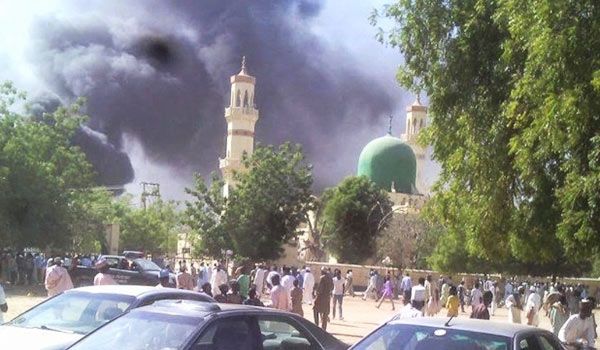[symple_box color=”blue” text_align=”left” width=”100%” float=”none”]
 Franck Bertrand Ayinda is an African academic and a world peace activist who relentlessly works to empower people to express their full potential and pursue their dreams, regardless of their background. Franck is a world traveler and an avid reader of books. Franck’s ultimate dream is to open a world-class human potential development school across Africa. His interest are politics, economics, and social justice.[/symple_box]
Franck Bertrand Ayinda is an African academic and a world peace activist who relentlessly works to empower people to express their full potential and pursue their dreams, regardless of their background. Franck is a world traveler and an avid reader of books. Franck’s ultimate dream is to open a world-class human potential development school across Africa. His interest are politics, economics, and social justice.[/symple_box]
Ifrane, Morocco- Boko Haram is a word tossed around in world media outlets without an understanding of what it represents or connotes. The group’s official name is not Boko Haram but Jama’atu Ahlis Sunna Lidda’awati wal-Jihad, which means “People Committed to the Propagation of the Prophet’s Teachings and Jihad.” Boko Haram, which literally means “Western Education is Forbidden,” was founded in 2002 by an Islamist cleric named Mohammed Yusuf in response to Nigeria’s democratic transition, nationalism and Western influence. Founding leader Mohammed Yusuf, killed in same year while in police custody, was succeeded by Abubakar Shekau.
Ironically, Yusuf, the sect leader, enjoyed the best of what the Western technology offered in the form of exotic cars, the latest communication equipment and the best medical services. In addition, his desire to fully prepare for jihad prompted him to sending people abroad for medical training, a development that alienated some of his members. Members are known to reference the Islamic verse that states “Anyone who is not governed by what Allah has revealed is among the transgressors.” Osama Bin Laden is known to have invested $13 million in northern Nigeria to promote his brand of Salafist Islamism. Bin Laden also endorsed an Islamist revolution in order to topple the Nigerian federal government and establish a sharia-based state. This fundamental Jihadi movement has been known for kidnapping the “Chibok girls” in 2014, The 2015 Baga massacre, and the burning of churches, mosques, and schools in favor of an abolition of the adoption of western values to African and Islamic traditions.
The immediate objective of Boko Haram is to establish strict sharia law. Although the twelve northern states have implemented sharia governance, Boko Haram believes it is too lenient and violates Islam. The organization regards itself as successor to Usman Dan Fodio’s Sokoto Caliphate, which ruled parts of Nigeria, Niger and Cameroon from 1804 until it was formally abolished by the British in 1904. Boko Haram regards the current Sultan of Sokoto, who has a traditional religious and tribal role, as un-Islamic as he cooperates with the Nigerian government. The group wants to concentrate all religious authority in their own hands. However, like all Islamists, Boko Haram’s ultimate objective is to bring all of mankind under sharia law. Yusuf preached that a sharia state “should be established in Nigeria, and if possible all over the world, through preaching the faith (dawa’).”
Since the Maitatsine uprising in the 1980s. Nigeria has always been the nest of inter and intra-ethnic-religious uprisings in a secular Nigerian state, which has led to a massive loss of human lives, questioning the identity of Muslims in Nigeria and Sub-Saharan Africans in general. The 2009 Boko Haram revolt is only part of many preceding upraisings that have contributed to its emergence. The 2009 revolt had reinforced Boko Haram’s will to impose an idea of Islam which was unusual to the religious sensitivity of Nigerians as a whole. Still, this very same religious sensitivity is one of the causes for the emergence of Jihadi fundamentalism, especially in the northern states of Nigeria.
The religious sensitivity of Nigerians provided fertile ground for the breeding of the Boko Haram sect, the sect’s blossoming was also aided by the prevailing economic dislocation in Nigerian society, the advent of party politics (and the associated desperation of politicians for political power), and the ambivalence of some vocal Islamic leaders, who, though they did not actively embark on insurrection, either did nothing to stop it from fomenting, or only feebly condemned it. These internal factors coupled with growing Islamic fundamentalism around the world make a highly volatile Nigerian society prone to violence, as evidenced by the Boko Haram uprising. Given the approach of the Nigerian state to religious conflict, this violence may remain a recurring problem.
The unbecoming social and economic state in the Nigerian society provided a fertile ground for the recruitment of youth with no perspective in life to join its ranks. At the dawn of multiparty politics in Nigeria, some politicians quest for power and status with the complicity of some Islamic leaders, and clerics did nothing to condemn the attitudes of these rioters and did not reject the idea of an insurgency to rally around them the votes of the most conservative elements of the Nigerian Islamic community. There is a long history of governance in Northern Nigeria being based upon religious (Islamic) legitimacy. This theme was reinforced by the British, who saw the Northern Nigerian (Islamic) aristocracy as the “natural rulers.” At independence, the British designed the Nigerian electoral system to guarantee the continued dominance of Northern Muslim elites. This state of affairs remained more or less the norm until the early 2000s, when political power shifted from the North, heavily Muslim, to the South, heavily Christian. This shift also coincided with an economic boom in Southern Nigeria. Northern Nigeria’s political class remained relatively wealthy, but they no longer had access to the sort of state resources with which to provide “a cut of the national cake” to Northern populations in the form of education and economic opportunity. Thus, Northern populations suffered increasing levels of poverty, even as many parts of the south began to enjoy significantly improved standards of living. It was during this time that calls for Shari’a Law became increasingly common in the North, as many people believed that the Sharia law would not only prevent crimes, (a growing problem in the North over the past two decades) but also political corruption.
Boko Haram is one of several organizations which have called for a “true Islam” as a mean of ending poverty and corruption, which some in the North see as a result of a political system tainted by greed and corruption (this is more the “Boko” of which the popular nickname of the group refers). The group does not actually reject all “Western Education” — more so it rejects what it sees as the corruption of the political class who have been driven by their desire for wealth to exploit the masses. It is worth noting here that in Northern Nigeria, one is not considered an adult until married, and it is impossible to get married unless one has amassed enough capital to set up a household. The London Times saw the uprising as a symptom of the social breakdown that has made Nigeria so prone to violence. Groups like Boko Haram thus play upon not only the financial, but also the social, marginality of young men who feel frustrated by the broader economic and political situation. This, coupled with stolen election mandates, has led to a growing disenchantment with the Western system of governance, particularly among jobless young men.
Interestingly, fanatical uprisings have mostly originated in the North, arguably the poorest part of the country. Although there is no conclusive link with jihadist movements outside Nigeria, the modus operandi of the sect, fashioned after the Taliban in Afghanistan, has generated some curiosities. Given its large followers and the claim that it had sent members to Afghanistan, Lebanon, Pakistan, Iraq,
Mauritania and Algeria for training, it could be that the Boko Haram modelled itself after the Taliban simply to acknowledge its source of inspiration. It could also be that it was meant to attract sympathy and support from the Taliban or related groups. Viewed from another perspective, it could also be that the links actually exist but have not been conclusively proven.
The loud speculation in the Nigerian and foreign press about the activities of groups like the Salafists of Preaching and Combat (GSPC) in Algeria, Tablighi clerics from Pakistan, and Wahabist missionaries from Saudi Arabia in Northern Nigeria, as well as the reported training of some fundamentalists in Al-Qaeda camps in some foreign countries, offer proof of Boko Haram’s links with fundamentalist groups around the world, however tenuous ones.
The role that partisan politics and political patronage play in the sustenance of the sect is obvious. It would appear that the introduction of Sharia in some Northern states beginning from 1999 encouraged closeness between Yusuf and some of the ruling and/or aspiring politicians as their decision aligned with his plan to promote strict adherence to Islamic law. But he was perhaps disappointed by the type of Sharia that was introduced across some Northern states that fell short of his standards. He may have believed either that the office-holders were not serious Muslims or that their Western education was hindering or limiting their commitment. The disappointment he felt following his abandonment by the political elite could have hastened his desire to effect a change through violence. Another dimension could be the failure to attach the Sharia-based law to social welfare schemes with the dividends of Sharia seemingly not forthcoming. Radicals thus had the opportunity to step in and demand a fully beneficial Islamic state.
When the fact that the Maitatsine riots broke out during the tenure of a civilian president in 1980 is taken into consideration, the link to Yusuf’s rise to political patronage could be understood. The thesis that politicians who patronize religious leaders, either for support or protective charms, use them as a tool and later discard them, or unleash them on innocent people, best describes Yusuf’s situation. Most of those who backed violent and revolutionary sects were politicians who needed the sect members’ violent disposition to achieve their political and, by extension, economic ends.
Adding to that, Al Qaeda’s attack on the world trade center’s towers in 2001, Madrid’s and London’s attack of a subway station and the “Talibanisation” of Afghanistan only inspired the emergence of Boko Haram. Those reasons are behind Boko Haram today being awaken, and constituting a threat to a perfectly functional Nigerian secularism, and to our accommodating Sub-Saharan African Islamic culture and values. Boko Haram is also a threat to the sovereignty of several nations bordering northern Nigeria (Niger, Cameroon, and Chad) which has instilled fear amongst the nomadic herdsmen, and Fulani populations who occupy and trade across all of northern Nigeria’s neighboring countries. Understanding the rise of Boko Haram allows us to understand fundamental Jihadi movements across West Africa and its influence on African societies.
[symple_box color=”blue” text_align=”left” width=”100%” float=”none”]
 Franck Bertrand Ayinda is an academic and a world peace activist who relentlessly works to empower people to express their full potential and pursue their dreams, regardless of their background. Franck is an Editor at The Moroccan Times, a world traveler and an avid reader of books. Franck’s ultimate dream is to open a world-class human potential development school across Africa. His interest are politics, economics, and social justice.[/symple_box]
Franck Bertrand Ayinda is an academic and a world peace activist who relentlessly works to empower people to express their full potential and pursue their dreams, regardless of their background. Franck is an Editor at The Moroccan Times, a world traveler and an avid reader of books. Franck’s ultimate dream is to open a world-class human potential development school across Africa. His interest are politics, economics, and social justice.[/symple_box]




